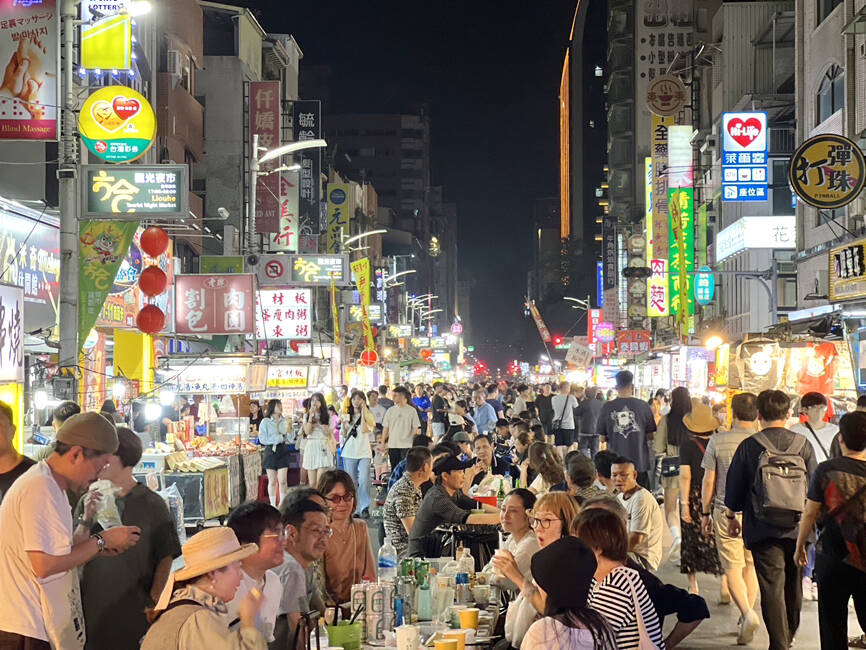Cheaper hotel rates and delicious street food made Taipei the most affordable city in Asia to visit in the second half of this year, a travel trend analysis conducted by Leisure and Travel magazine and the Web site Kayak.com showed.
Taipei and nine other Asian cities were selected as affordable travel destinations based on “average round-trip economy airfare” and “the average rate of a one-night stay in a standard double hotel room,” they said.
The results of their analysis, published on Wednesday last week, showed that the average cost of a round-trip flight and one night at a hotel in Taipei was US$1,141.

Photo: Ge You-hao, Taipei Times
“You can find highly rated hotels for under US$100 per night; many recent travelers to Taipei on Reddit report that they were able to find nice, but simple hotel rooms for US$45 a night, along with plenty of amazing street food like xiao long bao (Chinese steamed dumplings), bubble tea and mango shaved ice,” they said.
The city’s many night markets are a great place to find cheap eats and souvenirs, they added.
“If Taiwan’s beef noodle soup and pineapple cake are calling your name, now is the time to book,” they said.
Taipei was followed by Ho Chi Minh City and Jakarta, with a round-trip flight and one-night stay costing US$1,452 and US$1,478 respectively, the analysis showed.
The other affordable travel destinations in Asia were New Delhi, Bangkok, Manila, Tokyo, Kuala Lumpur, Hanoi and Osaka.
Kayak.com consumer travel trends expert Kayla Inserra DeLoache advised travelers to plan their trips during the “shoulder season” from October to November, when they can save up to 12 percent on flights compared with the peak travel season from May to July.

MISINFORMATION: The generated content tends to adopt China’s official stance, such as ‘Taiwan is currently governed by the Chinese central government,’ the NSB said Five China-developed artificial intelligence (AI) language models exhibit cybersecurity risks and content biases, an inspection conducted by the National Security Bureau (NSB) showed. The five AI tools are: DeepSeek, Doubao (豆包), Yiyan (文心一言), Tongyi (通義千問) and Yuanbao (騰訊元寶), the bureau said, advising people to remain vigilant to protect personal data privacy and corporate business secrets. The NSB said it, in accordance with the National Intelligence Services Act (國家情報工作法), has reviewed international cybersecurity reports and intelligence, and coordinated with the Ministry of Justice Investigation Bureau and the National Police Agency’s Criminal Investigation Bureau to conduct an inspection of China-made AI language

BOOST IN CONFIDENCE: The sale sends a clear message of support for Taiwan and dispels rumors that US President Donald Trump ‘sold out’ the nation, an expert said The US government on Thursday announced a possible sale to Taiwan of fighter jet parts, which was estimated to cost about US$330 million, in a move that an expert said “sends a clear message of support for Taiwan” amid fears that Washington might be wavering in its attitude toward Taipei. It was the first announcement of an arms sale to Taiwan since US President Donald Trump returned to the White House earlier this year. The proposed package includes non-standard components, spare and repair parts, consumables and accessories, as well repair and return support for the F-16, C-130 and Indigenous Defense Fighter aircraft,

CHECKING BOUNDARIES: China wants to disrupt solidarity among democracies and test their red lines, but it is instead pushing nations to become more united, an expert said The US Department of State on Friday expressed deep concern over a Chinese public security agency’s investigation into Legislator Puma Shen (沈伯洋) for “secession.” “China’s actions threaten free speech and erode norms that have underpinned the cross-strait ‘status quo’ for decades,” a US Department of State spokesperson said. The Chongqing Municipal Public Security Bureau late last month listed Shen as “wanted” and launched an investigation into alleged “secession-related” criminal activities, including his founding of the Kuma Academy, a civil defense organization that prepares people for an invasion by China. The spokesperson said that the US was “deeply concerned” about the bureau investigating Shen

LIMITS: While China increases military pressure on Taiwan and expands its use of cognitive warfare, it is unwilling to target tech supply chains, the report said US and Taiwan military officials have warned that the Chinese People’s Liberation Army (PLA) could implement a blockade within “a matter of hours” and need only “minimal conversion time” prior to an attack on Taiwan, a report released on Tuesday by the US Senate’s China Economic and Security Review Commission said. “While there is no indication that China is planning an imminent attack, the United States and its allies and partners can no longer assume that a Taiwan contingency is a distant possibility for which they would have ample time to prepare,” it said. The commission made the comments in its annual